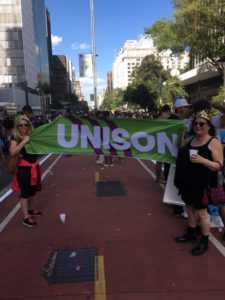
Louise Giblin reports: “We arrived in Araraquara late Sunday evening. On Monday we had our first meeting with 10 representatives from FERAESP (Federation of rural employees of Sau Paulo State).
“We discussed the progress of the ‘From the Land to the Plate’ project and ‘Generation of energy and food’ projects to be developed in two settlements with UNISON, Strathclyde & Sau Paulo universities.”
And Kaila adds: “Tuesday saw us with an early start, a trip to Piracicaba. We had a guided tour by the researcher Sandra H Cruz of the Luis de Queiroz Higher School of Agriculture, University of São Paulo – this is the oldest university in São Paulo.
“The campus extends to 3,825 hectares has 36 members of staff & 3,400 undergraduates & graduate students. This institute has been dedicated to Agriculture, Environmental, Biological & applied Social Science for more than 100 years. We were invited to visit the laboratory and meet with students.
“We then visited the Laboratory of Politics & Environmental Education and met with a student currently working on environmental waste management.
“After lunch we were taken to an ‘occupation camp’, which housed 200 families. Occupations are places (communities) that the government do not recognise as existing, they have no rights and can quite often be raided by the local police and asked to move. The houses are built from very basic, non permanent materials. It was incredible to see what the community were growing and producing. They sell their produce in local markets.
“Whilst travelling around this area in Brazil we are passing through miles upon miles of Sugar Cane & Eucalyptus plantations. These areas would have previously been covered by indigenous Tropical Atlantic forest, which would have had more biodiversity than the Amazon rain forest.
 |
 |
 |
 |
